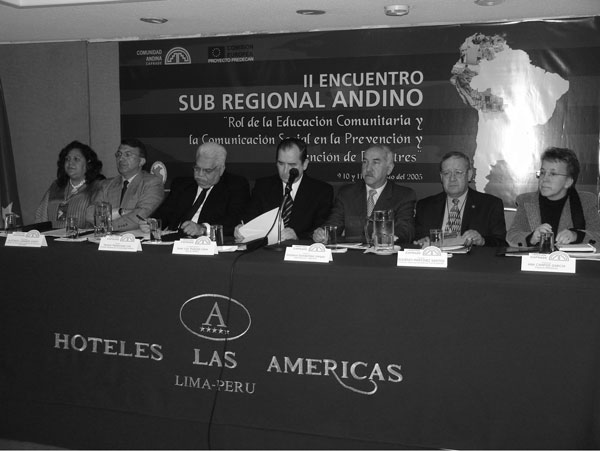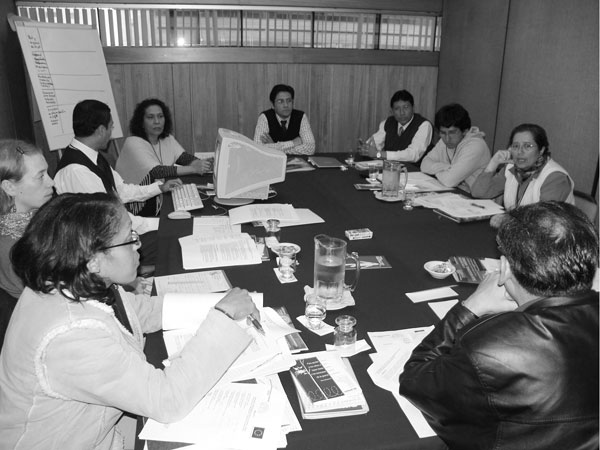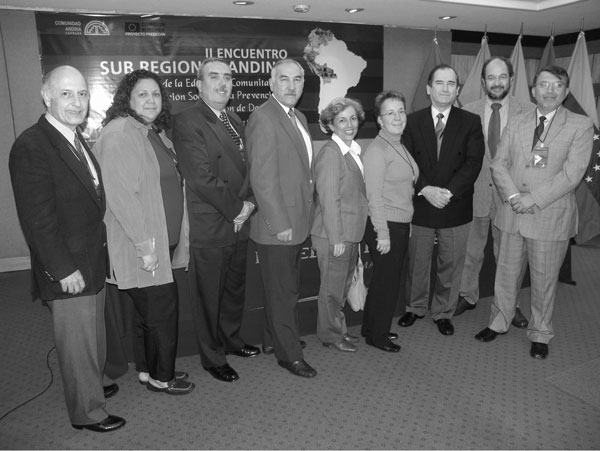

Latin America and the Caribbean
 |
 |
| International
Strategy for Disaster Reduction Latin America and the Caribbean |
Newsletter
ISDR Inform - Latin America and the Caribbean |
 |
|
Education
|
| Second andean
subregional encounter: “the
role of community education and social communication in disaster prevention
and response ” The Second Andean Subregional Encounter entitled “The Role of Community Education and Social Communication in Disaster Prevention and Response” was held on August 9-11, 2005 in Lima, Peru, and it was sponsored by PREDECAN. This event was held in the framework of Program 19 1 - which was included in the Operational Plan of the Andean Committee for Disaster Prevention and Assistance (CAPRADE) for 2004-2005. CAPRADE is presided over by Mr. Juan Luis Podestá, Real Admiral and head of the National Institute for Civil Defense of Peru. This event was also held in accordance with the fourth Specific Objective2 of the Andean Strategic Plan for Disaster Prevention and Assistance for 2005-2010. One of the aims of the Second Encounter was to facilitate a space for
participants to discuss and analyze the current role of community education
and social communication in the field of disaster prevention and response.
This was done in the framework of those values that seek the integration
of local knowledge to strengthen a culture of prevention. In addition,
the event also aimed at identifying existing community education programs
that examine the natural, cultural and social aspects of their environments,
in order to address specific issues related to disaster prevention and
response; facilitating mechanisms and spaces that permit civil society
to participate in disaster prevention and response activities and consider
the role of women in such processes; raising awareness of the joint responsibility
of the population for developing community education for disaster prevention
and response; and establishing a network of professionals in the field
of social communication in order to contribute to strengthen a culture
of prevention in the Andean subregion.
|
 |
|
It is worth mentioning that both the general and specific goals of this meeting were met through the active participation of delegations from the five countries that constitute this region (Bolivia, Colombia, Ecuador, Peru and Venezuela), as well as through the valuable contributions of the presentations delivered by the following guest speakers:
Furthermore, this meeting
permitted all participants to analyze the situation of community education
for disaster prevention and response
in the Andean subregion. This analysis contributed to complement the
results of the First Andean Subregional Encounter on Formal Education
for Disaster Prevention and Response, also held in Lima in April, 2005
in the framework of Program 16 3 of CAPRADE’s Operational Plan
for 2004-2005, as well as the fourth Specific Objective and Strategies
4.2 and 4.3 4 of the Andean Strategic Plan.
|
 |
|
In order to strengthen and consolidate the results of the First Encounter, “Learning to Prevent – CAPRADE” and the “Standards for Education Infrastructure in the Andean Subregion” it is imperative to support all actions taken to advance community education for and training in disaster prevention and response. This must be done taking into consideration that formal education is developed within society itself and that education communities are not only composed of teachers, students and parents, but also of society at large. The strengthening of a culture of prevention in Andean countries requires that joint efforts be devoted through the education systems already in place, which include formal education and all actions carried out through community education. The Second Encounter represented a valuable opportunity to exchange knowledge and lessons learned, and receive feedback for the further development of the Andean Subregional Community Education Plan for Disaster Prevention and Response. This is a basic document that contains both national and Andean analyses and includes the following elements: a formal proposal for basic strategies and actions that, if appropriately contextualized and adjusted to the own reality of each country, could be put into practice; a short-term agenda with the purpose of implementing the proposed strategies and committing to their completion; and conclusions and recommendations for the next five years. Jointly with the abovementioned results of the First Encounter, the Andean Subregional Community Education Plan for Disaster Prevention and Response will permit communities to build their capacities in the field of disaster prevention and response, and create the Andean Subregional Education and Training Network for Disaster Prevention and Response in the near future. For all these reasons, the Andean Subregional Community Education Plan for Disaster Prevention and Response must be supported by the Andean Community of Nations in order to obtain its approval and resource allocation for its implementation. National Governments should also support the Plan so that it is incorporated into their policies and actions. Finally, civil society should participate as key players in its implementation, so that disaster prevention and response actions are incorporated into local development processes. For additional information, please contact: 1 CAPRADE’s
Operational Plan for 2004-2005: Program 19 refers to community participation.
Sub-program
1: Promotion of community participation
in disaster prevention and response. Subprogram 2: Promotion of spaces
for community participation in municipal management related to disaster
mitigation, preparedness, response, recovery and reconstruction.
|
 |
| © UN/ISDR |